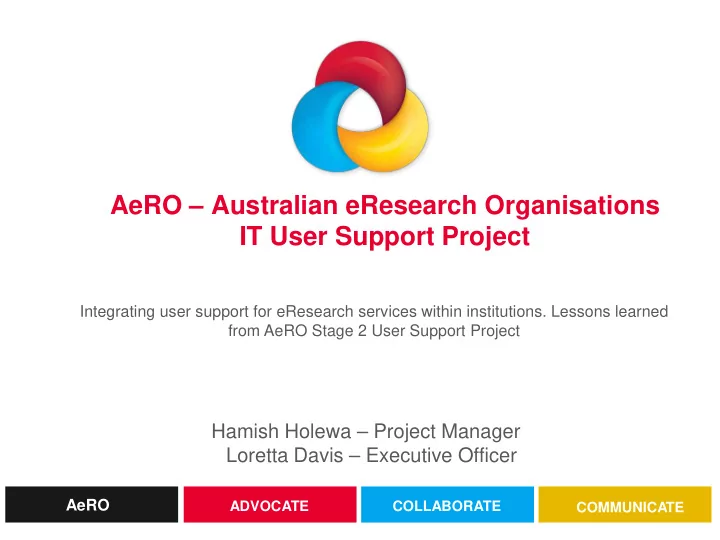

AeRO – Australian eResearch Organisations IT User Support Project Integrating user support for eResearch services within institutions. Lessons learned from AeRO Stage 2 User Support Project Hamish Holewa – Project Manager Loretta Davis – Executive Officer ADVOCATE COLLABORATE AeRO COMMUNICATE
What is AeRO? Australian eResearch Organisations Cooperative of member organisations Deliver national services to researchers ADVOCATE COLLABORATE COMMUNICATE 2
Our member organisations 3
User Support Project Drivers (2012/13) User support for research specific ICT services often fragmented Outside of their own institutions Limited formal support arrangements Researchers make demanding clients for ICT support - limited time available to be diverted from research - often highly individualised needs 4
Support frameworks - for now…and the future 5
Objectives 1. Save everyone time collecting research service information Open repository of user support knowledge – Tier 0, Tier 1 2. Improve user support practices with templates and protocols Propagate best practice standards to developers, help desks 3. Improve service usability and researcher Tier 0 Self-Support UX advice and improved Tier 0 support capability 4. Support new research-led services from RDSI and NeCTAR Assist embed best practices into wave of new researcher services (Neil Thelander study: major CAUDIT involvement) 6
User Support and Incident Management Framework Researchers Knowledge Base Tier 0 Institutions Communities/ Application Developers Infrastructure Operators Incident/Ticket Service Desk and Distribution – Tier 2/1 Tier 3 Resolution 7
How do you provide effective cross institutional user support for your researchers? How do you provide sustainable service provision? As an institution how do you know what services your researchers are using? 8
AeRO User Support Maturity Model AeRO Service Tiers Catalogue eResearch applications and 0 - Service definition services with Level 1 maturity Institutional service - Access to 1 desks, libraries and catalogue and eResearch units support details - Incident 2 management Infrastructure and ticket Operators (NeCTAR/ exchange RDSI Nodes) protocols 3
AeRO User Support Maturity Model
User Support Project Outcomes Service maturity model Service maturity in practice – the AeRO Tick Service catalogue – 30+ services approved Knowledge base – for all approved services UX improvement - 20 services assessed Incident management and ticket transfer framework Project outputs implemented and funded by NeCTAR University IT Research Support Expert Group Service Catalogue definitions 11
Lessons Learned 12
“ That is the beauty of things like the AeRO tick - a self- assessment tool that clarifies the gap you need to bridge.” Service application developer
Maturity models work well • Provides forward pathway • Non-accusatory/ non mandated • Acknowledges efforts already undertaken • Acknowledges differences in services and ability to change • Useful for sector in different states of maturity 14
Sector wide progress is gaining motemtum • Approx 65% of services listed in the catalogue have Level 2 maturity • NeCTAR funded program to lift maturity of Virtual Laboratories and Research Tools • 3 out of 11 applications identified as already reaching Level 2 maturity All stakeholder groups valued increasing metrics and uptake measures. Need ongoing commitment to ensure uptake measures go to the right people. 15
“The maturity model is about leadership. AeRO is providing a vehicle to provide leadership across nodes for the eResearch Sector.” Infrastructure Operator
Value of cross-sector initiatives Multiple stakeholder groups – not always work together Complex institutional support requirements (AeRO Tick vs AeRO Aware) Varying business models Need perspective for all parties and communicate perspective to other stakeholders Service to provide uptake to Institutions Institutions to provide contact points to Infrastructure Operators Engagement with other projects to avoid “silos” AeRO/ CAUDIT Initiative (highlight need to involved CAUL) Institutionally agnostic intent– transparent governance. Enable representative groups to inform and change project 17
Enable representative groups to inform and change project Ticket Exchange and Business Analysis Consultation & Workshop Use similar model for future projects – Enable representative groups to inform and change project Decide against automatic central ticket exchange More value from standardisation of communication and interoperability (point-to- point not hub and spoke) 18
“The (AeRO IT User Support) project is “right on the money”. Most universities are good at providing “contained” support within their own institution – however supporting researchers requires a broader inter-institution delivery model that includes external service providers. There needs to be a switch from internal focus to cross-institutional and cross-service provider support.” User Support Expert Group Member
eResearch University IT Expert Group / AeRO Aware Independent group – made up from wide representation of university support areas (Library, OoR, IT, eResearch) and locals (metropolitan/ regional/ G08 etc) Informed outputs of the Maturity Model and ways to integrate into institutions Not all institutions provide support in the same way. Ability to find and maintain contact details is difficult AeRO Aware – Increase knowledge of services available to researchers Focus on reuse of material and sharing of support material/ know who 20
Stage 3 and the future? Expand AeRO Tick Maturity Model Expand services in the service catalogue Further engage institutions via AeRO Aware Continue sector-wide leadership in knowledge exchange, interoperability and protocal development. 21
Interested in finding out more about AeRO? Visit our website www.aero.edu.au or contact enquiries@aero.edu.au ADVOCATE COLLABORATE AeRO COMMUNICATE
Recommend
More recommend